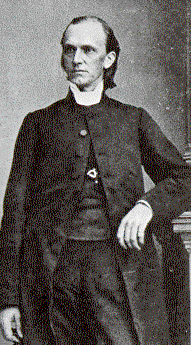There was one man in Minnesota who was not swept off his feet by the tide of passion which raged throughout the state. This was Henry Benjamin Whipple, who in November, 1859, at the age of thirty-seven had come to Minnesota as the first bishop of the Protestant Episcopal Church. He was descended from distinguished Revolutionary stock and was richly endowed with bodily and mental gifts. Debarred by infirm health in youth from completing the traditional classical education, he was thrown into business and political relations, which perhaps gave him a better raining for his future work than he might have got from the odes of Horace and Pindar.
If ever a man was fitted for the time and the place, Bishop Whipple was. Tall and strongly built, gracious but not patronizing in manner, he easily won the good will of men of every class and creed. His enthusiasm was tempered by a saving common sense and an abounding humor. He magnified his office, but only to do the greater service to those to whom he was called to minister. He laved all me; he feared no man. He had been in Minnesota but a fortnight when he made an excursion to Fort Ripley to ascertain the condition of the mission to the Chippewa at Gull Lake. The mission had been established some seven years before by the enthusiastic James Lloyd Breck, but he had been suspended in 1857 because of the turbulence of the Indians due to the inundation of fire water which followed the treaties of 1854 and 1855. This journey and its experiences kindled in the heart of the young bishop an interest in the red man which never abated to the end of his life.
Bishop Whipple informed himself of the condition and prospects of both nations and soon became satisfied that much of their wretchedness was chargeable to the indifference, not to say the rascality, of white men.
[O]n the sixth of March, 1862 Bishop Whipple addressed an open letter to President Lincoln, in which he summarized the iniquities of the Indian system and insisted on the supreme importance of placing the Indians under a government of law, administered by hones and capable men selected for their merit and fitness and not as a reward for political services.
Knowing as he did better than any other man in Minnesota, unless it was Sibley, the operation of the Indian policy and the machinations of selfish and dishonest officials, traders, employees, and half breeds, he was not surprised at the outbreak in August, 1862.
In the fall of 1862 Bishop Whipple was in Washington and, in company with his friend and relative, General Halleck, he called on President Lincoln. In he course of their interview he gave an account of the outbreak, its causes, and the sufferings of the Sioux. That he did this with the force and eloquence of which he was so capable may be inferred from a remark made by the president not long after: "He came here the other day and talked with me about the rascality of this Indian business until I felt it down to my boots." It is not likely that this impression had faded out when the president came to act upon the findings of the military commission. In December Bishop Whipple published in the St. Paul newspapers a calm, clear statement of the train of events which had led to this terrible explosion. So far as is known, he was the only public man who had the courage to face the whirlwind of popular denunciation of all Indians and of the Dakota in particular. To punish the guilty would avail little if the traditional Indian policy was to be left unreformed. In some quarters the bishop came in for denunciation almost as spiteful and unsparing as that directed against the Sioux themselves, but he never retracted a syllable nor budged an inch. [Folwell, A History of Minnesota, Vol. II]

